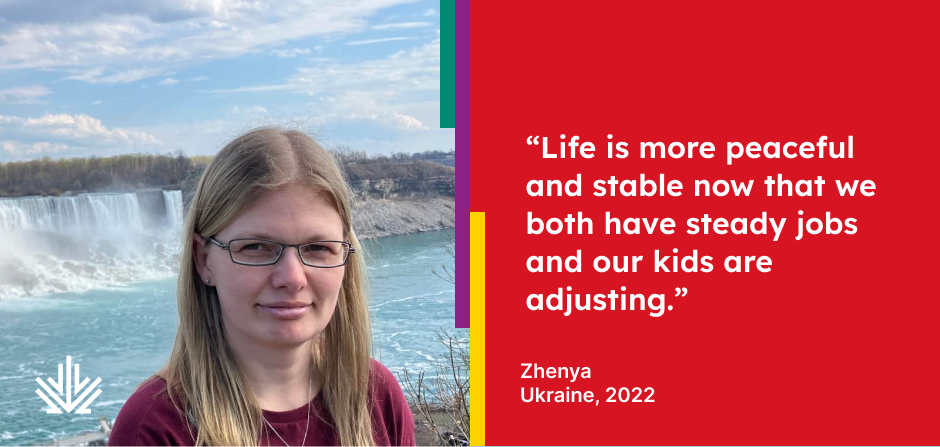From an interview with Zhenya Fedorenko
Zhenya left Ukraine in March 2022, shortly after the war began, with a plan to move to Canada with her two young daughters. They were among the first Ukrainians to arrive in Canada through the Canada-Ukraine Authorization for Emergency Travel (CUAET) program. Because her husband, Sergey, could not leave with them, she found the experience especially challenging, and adjusting to life in Canada was not always easy. However, with perseverance and support from her new community, she settled into a new home, started a career, and helped her daughters adapt to life in Canada. Now reunited with Sergey, she feels hopeful about their future in Canada. Here she shares her journey from Ukraine to Canada.
My husband, Sergey, and I had been researching and planning a move to Canada for three years when the war in Ukraine started. Since I was already following the latest information on Canada, I learned there would soon be a program to help Ukrainians come to Canada. We decided this was an opportunity for us to make our move, although it would be happening a lot sooner than we’d expected, and under very different circumstances.
Within two weeks of the war starting, I left our home with my two young daughters who were four and seven years old at the time. Unfortunately, men were not allowed to leave the country at this point, so Sergey couldn’t join us. We brought two suitcases—one had three sets of clothes for each of us, and one was filled with books for my work as a teacher, and for my older daughter’s school studies. Leaving was the hardest thing to do. I didn’t get to say goodbye to family, friends, or my students.
We lived in a city located in the middle eastern part of Ukraine and, like everyone else, we headed west where it was safer. Because there was so much panic at the train station as people rushed to leave, a friend connected us with a charity that could help us leave in a more organized way. They helped us take a train to Kyiv, then had organized buses to take us across the border to Poland. That was when my husband told me our city had been bombed. I knew, then, that we had made the right decision to leave.
At this time, I was working remotely as a tutor at a school for newcomer students based in Toronto. So, when the war started, the school’s staff did everything they could to support families like mine by collecting money and helping pay for trips so people, like us, could leave. With their financial help, I flew with my daughters to Norway to live with long-time friends as we waited for the Canadian program for Ukrainians to open up. We stayed for a month and a half.
This was a difficult time. Life basically stopped as soon as the war began and everyone in Ukraine was in shock. But the kids helped me to keep going. I still had to care for them and feed them. If it weren’t for them, I probably wouldn’t have left. My students from school also started asking me to have lessons with them again. This helped make life feel more normal.
Arriving in Canada
We arrived in Toronto on April 28, 2022 and were among the first people to come through the new Canada-Ukraine Authorization for Emergency Travel (CUAET) program. The school I’d been working for was very helpful, setting up three host families for us to live with in those first weeks. By June 1, we had rented our own apartment—a two-bedroom near the lake that was similar to our apartment in Ukraine.
When we moved in, people brought us so many things for our place—toys, clothes, bedding, furniture, everything we needed. We received so much that we were able to load two vans with donations to give to other Ukrainian families.
For the first eight months, I lived without my husband and found it hard being on my own. I continued to tutor for the school for awhile, but the hours were limited and I found it difficult to juggle evening and weekend hours while taking care of my kids full-time. I decided to find another job that was more manageable. I took a job as an interpreter at a settlement agency. When newcomer children had cultural or behavioural difficulties in school, teachers would call me and I would help translate their problems so they could be better addressed. I also provided translation services for welcome centres.
After getting settled into the new apartment, I was introduced to a group of women who lived in the neighbourhood. They offered to help with tasks, such as driving me and the kids to appointments and activities, answering my questions about Canada, and introducing me to people to grow my network. They were a tremendous help. And, when my husband arrived in early November, they helped both of us improve our resumes. We also relied on the services of YMCA and settlement services for that.
Landing a full-time job
Looking for jobs was discouraging at first. Everyone is very nice in Canada but sometimes they say they’ll get back to you, and then never call you back. We would wonder if we did something wrong. We would prefer to hear ‘no’ than to hear nothing at all. Before Christmas, our job search efforts weren’t getting much of a response, but things picked up in January, and my husband was offered a full-time job that he’s now happy with.
A few weeks later, I was offered an administrative job at a local firm through one of the connections I’d made. Even though I’d been teaching my whole life, I was ready for a change— something that wasn’t as emotionally draining as teaching. So much in my life was already challenging, so I wanted a job that didn’t require as much emotional energy. My new job is great, everyone is very nice and it offers me flexibility.
Now, Sergey and I work the same hours and since our locations are only three minutes apart, we can drive to and from work together. Shortly after arriving in Canada, my husband took the driver’s test and earned his ‘G’ class driver’s license. This was a huge relief. Life became much better and gave us greater comfort and freedom than before.
Finding peace and stability in Canada
Of course, our biggest wish is for the war to be over and to see our family again. But we’re happy that we came to Canada. Life is more peaceful and stable now that Sergey and I have steady jobs and our kids are adjusting.
Once their dad arrived in Canada, something clicked for the girls. Before that, they would suddenly start crying, or ask when are we going home? But once he joined us, they were more at peace and became more independent. They started dancing and singing again around the apartment.




